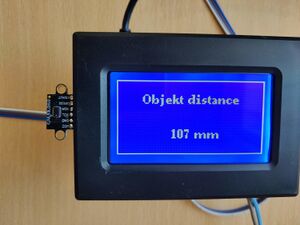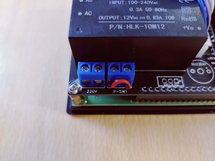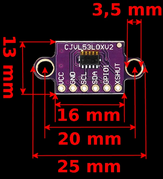LaserDistanceLCD: Difference between revisions
No edit summary |
No edit summary |
||
| Line 22: | Line 22: | ||
The sensor has to be mounted with two screws to the "zero point", looking at the 90° to the measured object. The sensor uses 5VDC to power and communicate with the I<sup>2</sup>C protocol. |
The sensor has to be mounted with two screws to the "zero point", looking at the 90° to the measured object. The sensor uses 5VDC to power and communicate with the I<sup>2</sup>C protocol. |
||
The sensor is connected with an |
The sensor is connected with an JST-XH 4 pin connector to the PCB, over one 1 meter long flat cable. |
||
Revision as of 11:25, 26 November 2022
Overview
LaserDistanceLCD is a panel-mounted measuring device. It uses laser light to measure the distance between the sensor and the object. The measurement is based on the ToF (time of flight) of light from the source (sensor) and is the reflection (object).
The measured distances can be shown in millimeters (mm) or inches (inch) in 18 different languages. Configuration of a device is made with LaserDistance software.
Hardware installation
The LaserDistanceLCD has to be mounted on a panel. The hole diameters have to be 97 x 72mm. The backside of the device is 45mm deep, so leave enough place to connect the cables. Powering off the device can be done with 220VAC or 110VAC. The sensor is connected with a 1-meter-long flat cable to the device.
By the installation place, please note that a device is about 45mm bold, so You have to leave enough place to access the cables and connectors from the sensor and from the programmer.
The sensor has two mounting holes, 20mm distance. By the mounting of the sensor, note that it needs to have a clear view of the measured object. Don't install the device in a humid environment, water tanks, etc. Also, the device must be used indoors and is not made for outdoor usage. Presents of high dust can affect the measurement. The possibility to reflect laser light can affect the measuring range.
Powering
LaserDistanceLCD uses 220VAC for powering. The power connector is on the back side in the bottom left corner, marked on the PCB with "220V". Next to the powering terminal screw, is the switching port, marked on the PCB with "P-SW1". It interrupts the powering of the device. If You need this function, just install an interrupter for 220VAC. In case You don't need this function, just shortcut it, because if You remove the wire on that connector, the device still stays in a not powered state. For the wiring, use 1.5mm2 cable, the maximal current that a device need is under 300mA at 220VAC.
Sensor installation
Sensing of the distance is done with the Time of Flight technique (ToF), provided by the STMicroelectronics VL53L0X ranging sensor. It has a measuring range of up to 1200mm in ideal condition.
The sensor has to be mounted with two screws to the "zero point", looking at the 90° to the measured object. The sensor uses 5VDC to power and communicate with the I2C protocol.
The sensor is connected with an JST-XH 4 pin connector to the PCB, over one 1 meter long flat cable.


